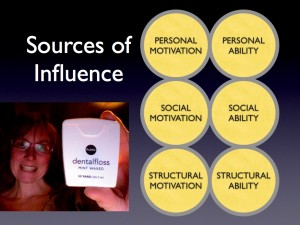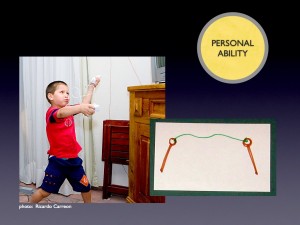 Last year, “gamification” started popping up everywhere – both in the marketing world where the term seems to have been born, and among game designers from the ARG scene, the “serious games” field, and in the social network space. Popular presentations about “games invade the real world” by Jesse Schell and others suddenly had me thinking back to the keynote presentation I gave at Nordic Game Jam in 2009, while I was Creative Director of Breakaway, a game-for-change created at the Emergent Media Center and sponsored by the United Nations Population Fund. In fact, this weekend is the Global Game Jam 2011, so it’s exactly the two-year anniversary of my talk! Wow.
Last year, “gamification” started popping up everywhere – both in the marketing world where the term seems to have been born, and among game designers from the ARG scene, the “serious games” field, and in the social network space. Popular presentations about “games invade the real world” by Jesse Schell and others suddenly had me thinking back to the keynote presentation I gave at Nordic Game Jam in 2009, while I was Creative Director of Breakaway, a game-for-change created at the Emergent Media Center and sponsored by the United Nations Population Fund. In fact, this weekend is the Global Game Jam 2011, so it’s exactly the two-year anniversary of my talk! Wow.
My presentation (which you can check out here) is based on the excellent book Influencer which talks about how long-lasting positive social change can be designed and reinforced (hint: it’s freaking HARD to inspire real change and make it stick). The book doesn’t talk much at all about games, but I saw a clear connection between almost every aspect of its techniques, and how game design skills could be applied to them.  If I’d pursued that line of thought, I could be on a white-hot lecture tour right now. But not only did I not pursue it, I hid the presentation in a folder, slunk away, and didn’t mention it again. The problem is, I couldn’t deal with the professional ethical quandary implied by my own ideas.
 Working on a meaningful game that is trying to invoke real-world behavior change is both an inspiring and somewhat terrifying prospect.  It’s not something we as game designers can treat blithely, without deep examination. I still haven’t worked through all of my feelings about what adding deep gameplay to the real world is going to ask of us as designers. My mind and heart are filled with questions like: At what point does our power to rhetorically and physically influence a player become simply glorified control? With such a powerful emotional and behavioral tool at our disposal, how can we possibly know that we are working within the bounds of ethics? Do the ends justify these means?
Working on a meaningful game that is trying to invoke real-world behavior change is both an inspiring and somewhat terrifying prospect.  It’s not something we as game designers can treat blithely, without deep examination. I still haven’t worked through all of my feelings about what adding deep gameplay to the real world is going to ask of us as designers. My mind and heart are filled with questions like: At what point does our power to rhetorically and physically influence a player become simply glorified control? With such a powerful emotional and behavioral tool at our disposal, how can we possibly know that we are working within the bounds of ethics? Do the ends justify these means?
If you’re a game developer right now, chances are good you will eventually be asked to integrate what you do with real world situations and behaviors. The boundaries of your magic circles will dissolve into homes, families, government, commerce, religion, and more. We need to start educating ourselves NOW. We need to be ready.
On February 4th and 5th at Transmediale festival in Berlin, A MAZE’s Thorsten Wiedemann and I are hosting a two-day video project, Controlled Invasion. We will be interviewing game designers and thinkers, as well as folks from across the spectrum of art, critical theory, technology, philosophy and the body. Our goal is to research and generate a manifesto – a compelling set of values and statements to focus the attention of game designers and content creators in the face of our ever-increasing moral responsibilities. It will not answer all the questions, nor demonize games as a medium. I hope it will help us make wiser choices about why and when to use the incredibly compelling physio-rhetorical power of gameplay.
Controlled Invasion